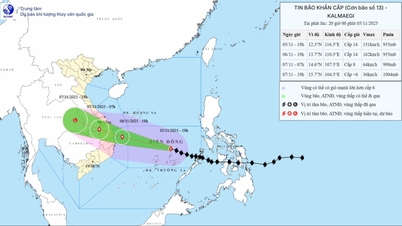Explosive demand in the billion-people market
Two months ago, e-commerce giant JD.com officially entered the food delivery market in China, launching the “JD Waimai” service. This move has caused a stir in the billion-people country’s market, especially when JD announced that it would pay social insurance for its entire official delivery team, a rare move in the industry.
The image of JD founder - billionaire Liu Qiangdong - personally delivering the goods went viral on the internet, creating a strong media effect. By April 22, JD announced that it had reached the milestone of 10 million orders/day, equivalent to nearly 1/6 of the number of daily orders of the veteran "giant" Meituan.
According to the South China Morning Post , in August 2023, Meituan set a record of 78 million orders per day, double that of the previous three years. In 2024, Meituan maintained an average of about 60 million orders per day.

In addition, JD announced plans to recruit 100,000 more shippers in the next 3 months to accelerate market share gains.
However, instead of bringing excitement to investors, the fierce competition caused the stocks of both groups to plummet. In the three days from April 22 to 24, Meituan and JD lost more than 5% and 6% each session, respectively, wiping out a total of more than 1,000 billion HKD in capitalization. From the beginning of the year to April 28, Meituan shares fell 15.36%, while JD lost 4.25%, according to Sohu Business .
Amid the frenzy of competition, the key question is: is food delivery really profitable? According to figures cited by JD, more than 60% of restaurants in China are currently operating at a loss. Meanwhile, some other food delivery platforms have reported gross margins of more than 40%.
However, JD was quite cautious when giving a forecast on the profit of the food delivery segment, with a target net profit margin not exceeding 5%.
This caution is not without reason. Meituan data shows that in 2021, the Chinese food delivery segment only achieved an operating profit margin of about 6.4%, much lower than on-site service segments such as hotel bookings or direct dining, which had a profit margin of up to 43.3%.
By 2024, when Meituan's main businesses such as food delivery, express delivery and restaurant reservations (collectively called "local commerce") are combined, the profit margin will only reach 20.9%.
The overall picture of the industry shows a lackluster profit. According to JP Morgan's April 2024 report, the net profit margin after tax of the world 's nine major food delivery platforms ranges from 1.5% to 3.3%, with an average of 2.2%. Meituan is slightly better at 2.8%, but this is still a modest figure compared to the level of risk and the huge investment capital required by this industry.
Controversy over commission fees
One of the hot points in the debate is the commission rate, a decisive factor that directly affects both food delivery platforms and restaurants.
Meituan says it only collects 6-8% in technical service fees from restaurants. However, many restaurant owners say they actually pay 25-30% when including fees such as advertising, delivery, insurance, promotions, etc. Some people liken this commission to “rent” in the online world.

International comparisons show that this problem is not limited to China. The major US food delivery platform DoorDash applies a fee structure of 6% base fee, plus a 15-30% delivery fee depending on the service package, and collects an additional 15% from users, bringing the total fee to 51%.
In China, after the reform in 2021, Meituan divided its commission structure into two parts: a technical service fee - equivalent to the platform commission that restaurants pay when using Meituan's service, and an order fulfillment fee - which only applies if restaurants choose to use Meituan's delivery service instead of operating their own delivery team.
However, the lack of transparency in the cost structure remains a source of contention between restaurants and platforms.
The cash flow behind the orders
According to the 2024 financial report, Meituan achieved a total revenue of 3,376 billion yuan, of which the local commerce segment contributed 2,502 billion - accounting for more than 74%. If we look at it in detail, Meituan's 3 main sources of revenue come from:
- Delivery fee (implementation fee): 980.7 billion yuan (29.05%)
- Commission (technical services): 922.9 billion yuan (27.33%)
- Online advertising: 488.4 billion yuan (14.47%)
In total, Meituan has raked in more than 1.4 trillion yuan from restaurants through commissions and advertising, a figure that suggests significant financial potential. However, profit margins remain quite thin.
The food delivery battle between JD and Meituan is ushering in a new phase in China’s super app wars. But behind the surge in orders lies a cold reality: food delivery isn’t as lucrative as it seems.
With thin profit margins and high operating costs, only financially strong and strategically minded companies can survive while restaurants still bear the brunt of the costs.
Tu Huy
(According to Sohu)
Source: https://vietnamnet.vn/thi-truong-giao-do-an-trung-quoc-tang-nhiet-co-hang-nhan-78-trieu-don-ngay-2397868.html







![[Photo] Opening of the 14th Conference of the 13th Party Central Committee](https://vphoto.vietnam.vn/thumb/1200x675/vietnam/resource/IMAGE/2025/11/05/1762310995216_a5-bnd-5742-5255-jpg.webp)



















![[Photo] Panorama of the Patriotic Emulation Congress of Nhan Dan Newspaper for the period 2025-2030](https://vphoto.vietnam.vn/thumb/1200x675/vietnam/resource/IMAGE/2025/11/04/1762252775462_ndo_br_dhthiduayeuncbaond-6125-jpg.webp)










































































Comment (0)